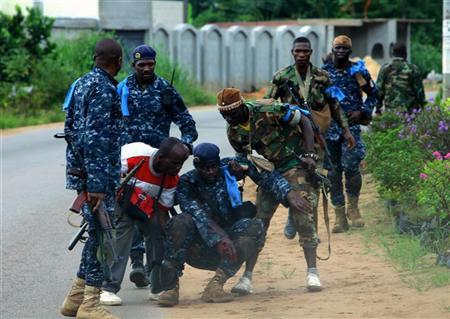"We are on the brink of genocide, something should be done," warned Ivory Coast’s new UN ambassador appointed by the internationally recognized President Alassane Quattara.
"We are on the brink of genocide, something should be done," warned Ivory Coast’s new UN ambassador appointed by the internationally recognized President Alassane Quattara.
After handing over his credentials as envoy to the United Nations to UN Secretary General Ban Ki-moon, the envoy Youssoufou Bamba made his plea on Wednesday, making him the first Ouattara government envoy to assume a diplomatic post since the November 28 disputed poll.
Quattara has been recognized following the elections as president by the world community, including the West African regional bloc ECOWAS, the United Nations and the European Union, who asked the defiant incumbent president Laurent Gbagbo, who also claims victory in the elections, to cede power to Quattara or face force.
Bamba said Ouattara had "real concern" about attacks on his supporters. According to UN rights officials at least 173 people were killed in attacks between December 16 and 21.
The victims were only killed "because they wanted to demonstrate, they want to speak out, they want to defend the will of the people," Bamba told reporters.
Bamba said people's homes in some areas had been marked according to their tribe. "What will be next? So the situation is very serious and I have put that message across in all the meetings I have had, including with the secretary general."
"The protection of civilians is at the heart of peacekeeping and we expect the United Nations to fulfill its duties," he said.
There is a UN force of more than 9,500 troops in Ivory Coast and 800 are deployed around the Abidjan hotel where Ouattara has his base.
Ban made no comment on the Ivory Coast crisis when he formally accepted Bamba's credentials in front of photographers at the UN headquarters.
But he assured the envoy "of the full cooperation of the secretariat in meeting the challenges ahead."
Ban was briefed again Tuesday by the UN mission in Ivory Coast on efforts to persuade Gbagbo to peacefully stand down, his spokesman Martin Nesirky said.
The UN chief also held telephone talks with Nigeria's President Goodluck Jonathan, current chairman of the ECOWAS, which has threatened to intervene militarily if Gbagbo does not quit.
Efforts to settle the dispute in Ivory Coast diplomatically continued on Wednesday, with Jorge Borges, the Cape Verde foreign affairs secretary, saying that the option of a military intervention by the ECOWAS was off the table for the moment.
His statement came after the presidents of Benin, Sierra Leone and Cape Verde briefed Goodluck Jonathan, the Nigerian president and current ECOWAS chairman, on their talks with Gbagbo on Tuesday.
The presidential delegation had delivered an ultimatum to Gbagbo to step down as leader or face removal by force.
Gbagbo has until January 3, the date of the next meeting, to respond.
"Whenever there is a dispute, whenever there is disagreement, it is dialogue that will solve issues," Jonathan said in the Nigerian capital, Abuja, where ECOWAS is based.
"The dialogue is on. They are encouraging us to go back."
Meanwhile, military chiefs of West African countries continued their talks on the crisis on Wednesday, Abde-Fatau-Musah, the ECOWAS director for external relations, said.
The talks covered "the military planning ... and the logistics" of any military operation, he said.
Last week, the 15-nation ECOWAS group vowed to use "legitimate force," if necessary, to ensure that Gbagbo steps down.
